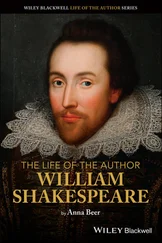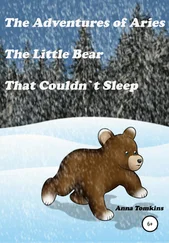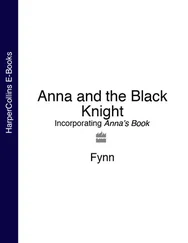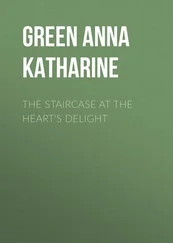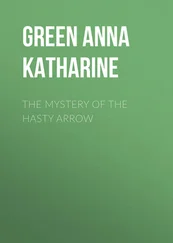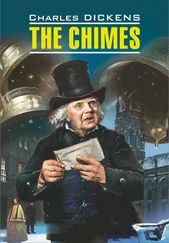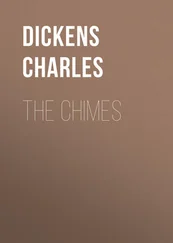Between the bent blue mettle of the bridge and the river. There, with its half-arch reflected like a mouth gulping at the river’s green water, a half-moon opening. Between river and city, between water and air. There are letters of white code painted across it that speak in letters I cannot read. ENTRY TO THE TRAITORS’ GATE, they say.
And something rises up. Bubbles to the surface. A picture.
I’m lying on my back. Pain in my temple and skull. Head in the water and light flickering through.
Someone in ragged jeans stands over me. A thickset boy of prentiss age with brown hair. Behind him, someone tall and lean with pale eyes and curled hair. And with the picture come the notes of a song, simple and clear. In the quiet times of power. I hear the notes unfold in front of me, and as they go past, I snatch them.
And then it’s Chimes.

I stride through the darkening streets past the tripropes and the gatehouse of rusted cranes, past the rest of them sitting in the storehouse with instruments held and their faces turned toward me tacet in shock and relief and I go straight to my quarters.
Candle by snuffed candle, the dark comes. Sitting there with my back against the wall, I finger the riverstone I took on the strand. The arrival in London? I go to the shelf where I keep my memory bag. Next to it is a block of hardwood with a pencil sketch of two figures. Next to that is a bundled-up garment streaked in mud. I stand there and look at these two things I have left out in the shallows like a message for myself. I stand there and I finger the riverstone and I see myself flat on my back with my head in the water and I hear the song creeping by me on the waters.
Oddments in thamesmud, these memories. Unlinked and unmeaning. And then I put them together in a line.
The arrival in London? the voice asks. I sweep through the debris in my head. Do it like Harry’s hand does to clear shell and stone. Empty so that the pictures can rise. I see myself standing in mud on a long road. What road was it? What was I doing there? I was leaving the farm I had grown up on. Why? What happened to my parents?
I feel the grip of my mother’s hand, shaking. I see her worsen with the shaking. I see her speak to me in the pause of the spasms.
I see myself travelling to London alone. No, not alone. With a carter, on the back of a cart. He gives me his burberry and I go into the noisy streets. I was looking for someone, something, but I couldn’t find it. Then Chimes came and everything was stripped clean and quiet.
And I heard the silence of the Lady and I went, for the first time, down to the river. To the strand. Then my head knocked half through by the blow of a thrown stone. Down by the ruins of the tower, Brennan threw a stone that hit me. With my head in the river I heard a song.
The first time I laid eyes on Lucien he stood, pale and blind, with the light in his hair. Then the edge of his mouth twitched up. Half-grin, half-smirk.
And then he said something else, under his breath and to me alone.
‘That song,’ he said. ‘It’s worth your life in these parts.’
I didn’t understand what he meant. I didn’t say anything, just kept my eyes empty like I know how to do. And he waited, examined me somehow, though without sight. Then the moment passed and the edge returned to his voice.
‘Forgive Brennan,’ he said. ‘He is very protective of our territory.’
The voice in my head is Lucien’s. The questions are Lucien’s. The song is how he chose me. It is where his questions started and the place to which they always circle back.
The darkness that has kept me covered for so long pulls back. In the half-light that is not yet understanding, I stand up. And finally, finally I walk out to the balcony where Lucien is waiting for me.
The moonlight falls on his face. When his voice comes, it is as clear as Chimes.
‘The arrival in London,’ he asks, ‘what was it like?’
‘I was standing alone on the roadside in the rain,’ I say.
The words seem to come from someone else, or some bit of me I can’t touch or feel. Like bodymemory from a missing leg or finger. ‘I was waiting for somebody to come along the road and give me a ride to London. I waited for a long time before a carter stopped. He handed me his burberry and I put it on, and we went into the city.’
‘Good. Where were you waiting?’
Saltflats in the horizon. Flat fields. A farmhouse with a red door.
‘Outside of London. Essex.’
Lucien is doing something with his hands, twisting a bit of leather cord. He knots it and threads it between his palms. Then he does something complicated and quick with his fingers so that the cord stretches between his open hands like a noose.
‘Why were you leaving the farm?’
I pause. A white shape moves up in me. I don’t want to look at it, but I have to.
‘They died. Both of them. My mother first.’
‘What did they die from?’
‘First my mother’s hands started to shake. It wasn’t bad at first; she could still work. She could do solfege at Chimes, make bread. Then it got worse. She could hardly hold a pencil.’ My voice fades. I stare at my own hands until they blur in front of my eyes.
‘After that she couldn’t walk and had to stay in bed. Then she could hardly talk. Then she found it hard to breathe.’ I try to keep my voice calm. I rub my eyes. ‘She died, and then my father. I don’t remember his death. It must have been soon after.’
And they were buried twice. Once in the ground, once in my memory. My heart hurts. What had I felt before in that spot? Numbness. Hard and lifeless like a dry riverstone.
‘I am sorry, Simon,’ Lucien says. He pulls the cord from his hands so that he can sign the mourning cadence of the formal solfege.
Then he looks at me harder, measuring.
‘Simon,’ Lucien says, ‘after your arrival in London, how did you find us? How did you find the pact?’
‘I didn’t find you. You found me . I heard the Lady, and I went down to the river. I was trying to find where the silence was coming from. Then Brennan bloody well knocked me out.’
Lucien laughs. ‘Brennan saw you. If I remember right, he said, “There’s some Walbrook scum on our turn, right in broad daylight.” Before I could stop him, he threw the stone. He hit you and you fell into the water and stayed there. I thought he might’ve killed you. When we got closer, he saw what you were wearing. Farmclothes. So we knew you weren’t Walbrook. Not Effra or Neckinger either. You weren’t even some prentiss who’d stolen a leisure hour for mudlarking. It wasn’t chance or mistake had brought you to the Pale. You heard the Lady and you went straight to her.’
‘But you didn’t ask me to join the pact because of my hearing,’ I say.
To put the memories down like this in a line that starts in one place and moves to another, to know that they live outside me in Lucien’s keeping — not just hoarded in a memory bag. It rings through me that thought, like his voice does. ‘It was the song that came to me when I was head down in the river. You recognised it and warned me against singing it.’
‘Yes. That’s right.’
‘Well, what does it mean?’
He shakes his head lento. ‘That’s what I need you to tell me. Can you sing it?’
‘No.’ But as I say it, words come into my head.
‘ In the quiet days of power ,’ I say. All at once I am certain. ‘That’s how it starts.’ Then I stop. ‘I don’t know what comes next.’
‘Take your time,’ says Lucien.
I close my eyes. Why was I coming into London, and what did it have to do with the song? Pictures float up and pull apart and come together again. Then at last I see a picture of my mother standing next to me. We are working. I feel the rhythm of it in my hands, a grip and twist like kneading bread. Then my mother singing.
Читать дальше
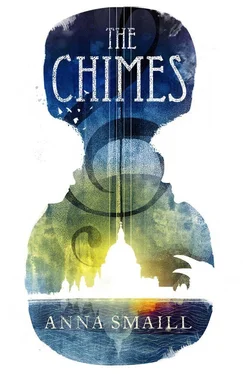


![Чарльз Диккенс - Колокола [The Chimes]](/books/395589/charlz-dikkens-kolokola-the-chimes-thumb.webp)
